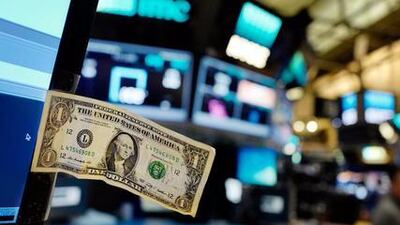The dollar inched higher against a basket of major currencies on Friday and was on track for its biggest weekly gain so far this year as investors pondered the Trump administration’s tax plan and the outlook for Federal Reserve policy.
The dollar index edged up 0.1 per cent to 93.211 .DXY.
While that was down from Thursday’s near six-week high of 93.666, the index has still risen 1.1 per cent this week, putting it on track for its biggest weekly gain since December.
The dollar has risen on renewed hopes for US tax reform, as well as comments from Federal Reserve Chair Janet Yellen that stressed the need for gradual interest rate hikes.
Profit-taking and caution about political hurdles facing the US tax plan seem to be tempering the dollar’s momentum, said Stephen Innes, head of trading in Asia-Pacific for Oanda in Singapore.
“We’ve been down this tax reform road before, and I don’t think it’s going to be easy... There’s going to be a lot of back and forth, a lot of squabbling,” Mr Innes said.
The White House struggled on Thursday to defend its new tax plan against criticism that it would help the rich at the expense of lower classes, as republicans in Congress prepared to move ahead with actual legislation.
President Donald Trump had unveiled a plan on Wednesday that calls for lower tax rates for businesses and individuals as part of a comprehensive overhaul of the US tax code.
Against the yen, the dollar edged up 0.3 per cent to 112.66 yen JPY=. On Wednesday, the dollar had reached a 2-1/2 month high of 113.26 yen, buoyed by a rise in US bond yields.
Later on Friday, investors will turn their focus to US. economic data, including the personal consumption expenditures (PCE) price index for August.
_____________________
Read more:
Emerging markets asset classes appealing to investors
Euro slides on far right surge in German polls
_____________________
One focus for next week is U.S. job data due on October 6.
“The immediate focus would be whether the market can look through the data volatility in the US,” said Sim Moh Siong, FX strategist for Bank of Singapore, adding that the nonfarm payroll data is likely to reflect the effects from Hurricanes Harvey and Irma.
The euro eased 0.1 per cent to $1.1777 EUR=, but remained above Wednesday's trough of $1.1717, the common currency's lowest level in more than a month.
The common currency has rallied nearly 12 per cent against the dollar so far this year as worries about the rise of anti-establishment political forces in Europe faded while expectations rose for tapering the European Central Bank’s stimulus.
The euro, however, has been weighed down this week after the results of elections in Germany on Sunday. Chancellor Angela Merkel won a fourth term in office but will have to build an uneasy coalition to form a government.
Sterling eased 0.2 per cent to $1.3418 GBP=D3.
On Thursday, it had gained 0.4 per cent, after Britain’s Brexit secretary said “considerable progress” had been made in talks and the EU’s chief negotiator praised a “new dynamic” from the prime minister.

